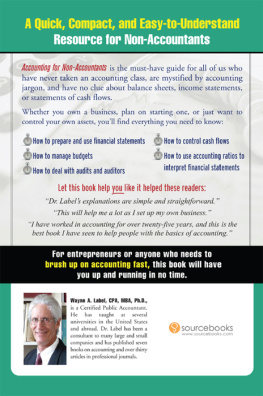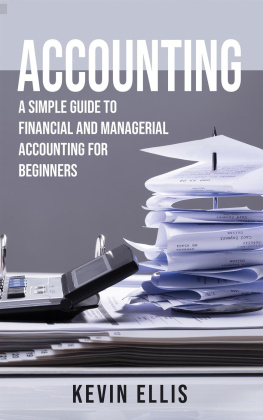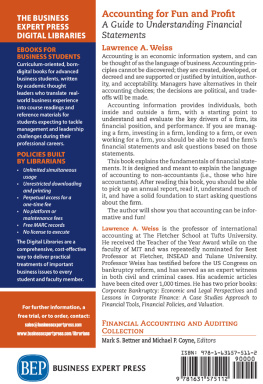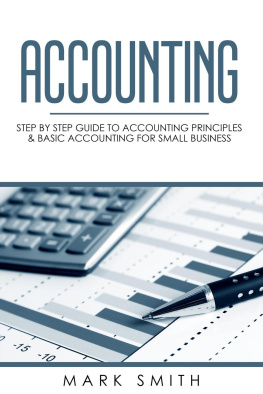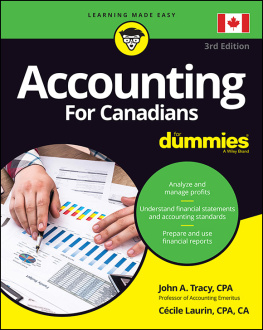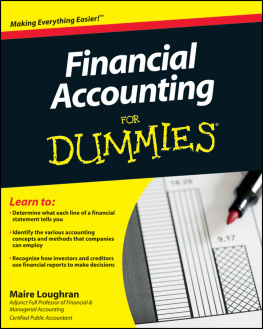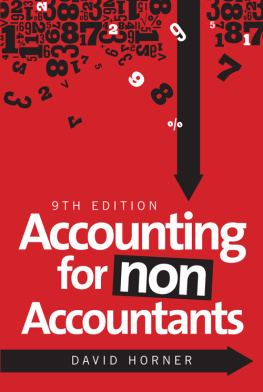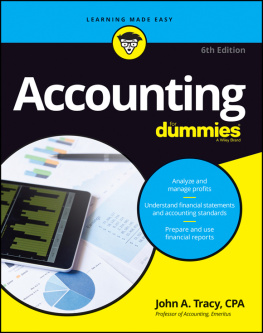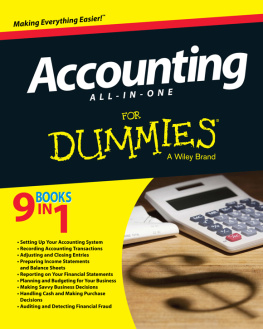
Copyright 2013 by Wayne Label
Cover and internal design 2013 by Sourcebooks, Inc.
Cover images peepo/iStockphoto.com
Sourcebooks and the colophon are registered trademarks of Sourcebooks, Inc.
All rights reserved. No part of this book may be reproduced in any form or by any electronic or mechanical means including information storage and retrieval systemsexcept in the case of brief quotations embodied in critical articles or reviewswithout permission in writing from its publisher, Sourcebooks, Inc.
This publication is designed to provide accurate and authoritative information in regard to the subject matter covered. It is sold with the understanding that the publisher is not engaged in rendering legal, accounting, or other professional service. If legal advice or other expert assistance is required, the services of a competent professional person should be sought. From a Declaration of Principles Jointly Adopted by a Committee of the American Bar Association and a Committee of Publishers and Associations
All brand names and product names used in this book are trademarks, registered trademarks, or trade names of their respective holders. Sourcebooks, Inc. is not associated with any product or vendor in this book.
Published by Sourcebooks, Inc.
P.O. Box 4410, Naperville, Illinois 60567-4410
(630) 961-3900
Fax: (630) 961-2168
www.sourcebooks.com
Library of Congress Cataloging-in-Publication Data
Label, Wayne A. (Wayne Allan), 1943
Accounting for non-accountants : the fast and easy way to learn the basics / Wayne A. Label. 3rd ed.
p. cm.
Includes bibliographical references and index.
(trade paper : alk. paper) 1. Accounting. 2. Financial statements. I. Title. II. Title: Accounting for nonaccountants.
HF5636.L33 2013
657dc23
2012038503
Printed and bound in the United States of America.
VP 10 9 8 7 6 5 4 3 2 1
Contents
Acknowledgments
A big thanks goes out to Florencia Cordero for her patience with me as I worked on this third edition. Her support, encouragement, and one-woman marketing department made this third edition possible.
I would also like to thank the thousands of students and entrepreneurs of the first and second editions whose comments and suggestions have helped to improve this book.
Introduction
What is accounting? Who needs it? How does it benefit businesses?
This book answers those questions for the non-accountant.
Accounting provides information that helps people in business increase their chances of making decisions that will benefit their companies. Accounting is the language of business, and like other languages, it has its own terms and rules. Understanding this language and learning to interpret it is your first step to becoming successful in your own business and in your personal financial life as well.
In your personal life you can use accounting information to make decisions about investing in the stock market, applying for a loan, and evaluating potential jobs. Banks use accounting information to make decisions about granting loans. Government agencies base their regulations on accounting information. Accounting information can even be useful to non-business entities with an interest in how businesses affect local, national, or foreign communities and community members. Businesses use accounting information for planning and budgeting and for making decisions about borrowing and investing. Overall, accounting aids businesses in the process of making better decisions.
The basics of accounting are the same regardless of the size or type of business. In Accounting for Non-Accountants, you will learn the basics of accounting through the examination of an imaginary small business, Solana Beach Bicycle Company. For more complex businesses, the economic transactions become more varied and complex, as does the process of reporting them to various users. The foundation of it all, however, remains the same. This book will give you a solid foundation you will be able to use in any accounting situation you encounter.
Whether you own a business or do not, even if youve never had any experience with accounting and financial statements, this is the book for you.
Several changes have been made to create this third edition.
Chapter 2, Generally Accepted Accounting Principles, has been expanded to include a comparison of U.S. standards to those of the International Accounting Standards Board and a discussion of these differences. In chapter 5, the entire approach to the Statement of Cash Flows has been changed to make it more understandable to non-accountants. Many changes have been made to chapter 11, Audits and Auditors, to include more information on the Sarbanes-Oxley Act, which puts more responsibility on the management of companies as well as the auditors to better report areas of potential fraud and weaknesses in internal control. A new chapter has been added (chapter 12) to discuss fraud and ethics and how ignoring these issues can be the downfall of a small business. The appendix on websites to help accountants and non-accountants has been expanded, and a new appendix has been added with useful questions and answers for you to use as a reference after reading the book.
One of the biggest and most exciting changes in this third edition is reader access to two new websites that offer a wealth of accounting resources for the non-accountant. Free online tests and practice problems not found in the book are available exclusively to Accounting for Non-Accountants readers at with your thoughts on the book or on the other materials, or questions about accounting in general.
Chapter 1
Introducing Accounting and Financial Statements
- What Is Accounting?
- Who Uses Accounting Information?
- Financial Statements
- How Different Business Entities Present Accounting Information
What Is Accounting?
The purpose of accounting is to provide information that will help you make correct financial decisions. The accountants job is to provide the information needed to run a business as efficiently as possible while maximizing profits and keeping costs low.
Quick Tip
Finding an Accountant: Hiring a professional and ethical accountant to aid in your business operations can be critical to the success of your company. Meet with a few accountants before making a final choice so that you know your options and can select one whose experience and work style will be best suited to your needs and the needs of your business. Local chapters of your state societies of CPAs offer referral services that can help with this.
Accounting plays a role in businesses of all sizes. Your kids lemonade stand, a one-person business, and a multinational corporation all use the same basic accounting principles. Accounting is legislated; it affects your taxes; even the president plays a role in how accounting affects you.
Accounting is the language of business. It is the process of recording, classifying, and summarizing economic events through certain documents or financial statements. Like any other language, accounting has its own terms and rules. To understand how to interpret and use the information accounting provides, you must first understand this language. Understanding the basic concepts of accounting is essential to success in business.
Different types of information furnished by accountants are shown in figure 1.1 on the next page.
Next page
